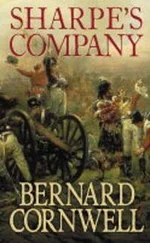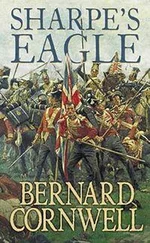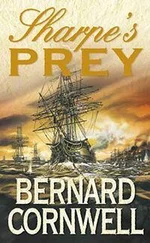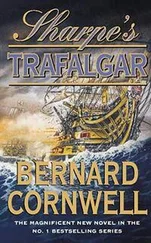Colonel Elphinstone, sensing that Sharpe was miles away again, kicked the Rifleman’s ankle and Sharpe recovered attentiveness in time to hear Bampfylde inviting the assembled officers to dine with him.
“I fear I can’t.” Sharpe did not want to stay in this cabin where his disappointment had shamed him in front of so many officers. It was a petty motive, pride-born, but a soldier without pride was a soldier doomed for defeat.
“Major Sharpe,” Bampfylde explained with ill-concealed scorn, “has taken a wife, so we must forgo his company.”
“I haven’t taken a wife,” Elphinstone said belligerently, “but I can’t dine either. Your servant, sir.”
The two men, Sharpe and Elphinstone, travelled back to St Jean de Luz in Bampfylde’s barge. Elphinstone, swathed in a vast black cloak, shook his head sadly. “Bloody madness, Sharpe. Utter bloody madness.”
It began to rain. Sharpe wished he was alone with his misery.
“You’re disappointed, aren’t you?” Elphinstone remarked.
“Yes.”
“Wigram’s a bastard,” Elphinstone said savagely, “and you’re to take no bloody notice of him. You’re not going to Bordeaux. Those are orders.”
Sharpe, stirred from his self-pity by Elphinstone’s ferocious words, looked at the big Engineer. “So why are we taking the fort, sir?”
“Because we need the chasse-marees, why else? Or were you dozing through that explanation?”
Sharpe nodded. “Yes, sir.”
The rain fell harder as Elphinstone explained that the whole Arcachon expedition had been planned simply to release the three dozen chasse-marees that were protected behind the fortress guns. ”I need those boats, Sharpe, not to waltz into bloody Bordeaux, but to build a bloody bridge. But for Christ’s sake don’t tell anyone it’s a bridge. I’m telling you, because I won’t have you gallivanting off to Bordeaux, you understand me?“
“Entirely, sir.”
“Wigram thinks we want the boats for a landing, because that’s what the Peer wants everyone to think. But it’s going to be a bridge, Sharpe, a damned great bridge to astonish the bloody Frogs. But I can’t build the bloody bridge unless you capture the bloody fort and get me the boats. After that, enjoy yourself. Go and ambush the high road, then go back to Bampfylde and tell him the Frogs are still loyal to Boney. No rebellion, no farting about, no glory.” Elphinstone stared gloomily at the water which was being pocked by the cold rain into a resemblance of dirty, heaving gunmetal. “It’s Wigram who’s got this bee in his bonnet about Bordeaux. The fool sits behind a bloody desk and believes every rumour he hears.”
“Is it a rumour?”
“Some precious Frenchman pinned his ear back.” Elphinstone plucked his cloak even tighter as the barge struggled against the current-sweeping about the sandbar. “Michael Hogan didn’t help. He’s a friend of yours, isn’t he?”
“Yes, sir.”
Elphinstone sniffed. “Damned shame he’s ill. I can’t understand why he encouraged Wigram, but he did. But you’re to take no notice, Sharpe. The Peer expects you to take the fortress, let bloody Bampfylde extract the boats, then come back here.”
Sharpe stared at Elphinstone and received a nod of confirmation. So Wellington was not unaware of Wigram’s plans, but Wellington was putting his own man, Sharpe, into the operation. Was that, Sharpe wondered, the reason why he had lost his Battalion?
“It wouldn’t matter,” Elphinstone went on, “except that we need the bloody Navy to carry us there, and we can’t control them. Bampfylde thinks he’ll get an earldom out of Bordeaux, so stop the silly bugger dead. No rising, no rebellion, no hopes, no glory, and no bloody earldom.“
Sharpe smiled. “There’ll be no fortress unless I have decent troops, sir.”
“You’ll get the best I can find,” Elphinstone promised, “but not in such numbers that might tempt you to invade Bordeaux.”
“Indeed, sir.”
The oarsmen were grunting with the effort of fighting the tide’s last ebb as the barge rounded the harbour’s northern mole. Sharpe understood well enough what was happening. A simple cutting out expedition, necessitating the capture of a coastal fort, was needed to release the chasse-marees, but ambitious officers, eager to make a name for themselves in the waning months of the war, wished to turn that mundane operation into a flight of fancy. Sharpe, who would make the reconnaissance inland, was ordered to blunt their hopes.
The steersman pointed the boat’s prow towards a flight of green-slimed steps. The white-painted barge, in smoother water now, cut swiftly towards the quay. The rain became tempestuous, slicking the quay’s stones darker and drumming on the top of Sharpe’s shako.
“In oars!” the steersman shouted.
The white bladed oars rose like wings and the craft coasted in a smooth curve to the foot of the steps. Sharpe looked up. The harbour wall, sheer and black and wet, reared above him like a cliff. “How high is that?” he asked Elphinstone.
The Colonel squinted upwards. “Eighteen feet?” Then Elphinstone saw the point of Sharpe’s question and shrugged. “Let’s hope Wigram’s right and they’ve stripped the Teste de Buch of defenders.”
Because if the fort’s enceinte was defended Sharpe would have no chance, none, and his men would die so that the naval officer could blame the Army for failure. That was a chilling thought for a winter’s dusk in which the rain slanted from a steel-grey sky to pursue Sharpe through the alleys to where his wife sewed up a rent in his old jacket; his battle-jacket, the green jacket that he would wear to a fortress wall that waited for him in Arcachon.
“I suppose,” Richard Sharpe said harshly, “that the Army couldn’t find any real soldiers?”
“That’s about the cut of it,” the Rifle captain replied. “Mind you, I suppose the Army couldn’t find any real commanding officers either?”
Sharpe laughed. Colonel Elphinstone had done his best, and that best was very good indeed for, if Sharpe could not take his own men into battle, then there was no unit he would rather lead than Captain William Frederickson’s men of the 60th Rifles. He took Frederickson’s hand. “I’m glad, William.”
“We’re not unhappy ourselves.” Frederickson was a man of villainous, even vile, appearance. His left eye was gone and the socket was covered by a mildewed patch. Most of his right ear had been torn away by a bullet while two of his front teeth were clumsy fakes. All the wounds had been taken on the battlefield.
Frederickson’s men, with clumsy and affectionate wit, called him ‘Sweet William’. The 60th, raised to fight against the Indian tribes in America, was still known as the Royal American Rifles, though half the Company were Germans, a quarter were Spaniards enrolled during the long war, and the rest were British except for a single, harsh-faced man who alone justified his regiment’s old name. Sharpe had fought alongside this Company two years before and, seeing the bitter face, the name came back to him. “That’s the American. Taylor, isn’t it?”
“Yes.” Frederickson and Sharpe stood far enough from the two paraded Companies so their voices could not be overheard by the men.
“We might come up against some jonathons,” Sharpe said. “There’s some bugger called Killick skulking in Arcachon. Will it worry Taylor if he has to fight his countrymen?”
Frederickson shrugged. “Leave him to me, sir.”
Two Companies of the green-jacketed Riflemen had been given to Sharpe. Frederickson commanded one, a Lieutenant Minver the other, and together they numbered one hundred and twenty-three men. Not many, Sharpe thought, to assault a fortress on the French coast. He walked further along the quay with Frederickson, stopping by a fish cart that dripped bloody scales into a puddle. “Between you and me, William, it’s a mess.”
Читать дальше







